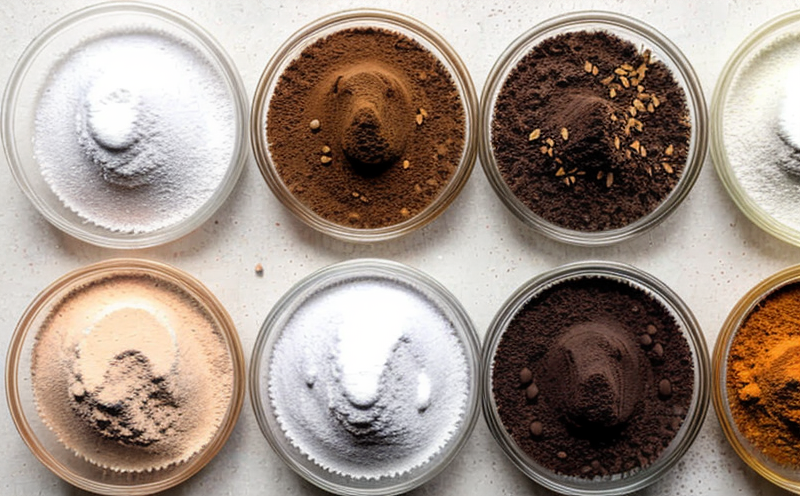ISO 21734 Sunset Yellow Profiling in Bakery Products
The European standard ISO 21734 outlines a method to profile the colorant sunset yellow (E110) in bakery products. This method is essential for ensuring compliance with food safety regulations and maintaining consistent product quality. Sunset yellow, also known as FD&C Yellow No. 5 or CI 15985, is widely used in the baking industry due to its bright orange-yellow color, which enhances visual appeal.
The application of ISO 21734 is particularly critical in bakery products where color stability and uniformity are paramount. Sunset yellow can degrade over time under certain environmental conditions such as heat, light, or moisture. This degradation process is known as the "sunsetting" phenomenon. Profiling sunset yellow according to ISO 21734 helps food manufacturers monitor this process and ensure that their products meet regulatory standards for colorant presence and performance.
The standard specifies detailed procedures for extracting and quantifying sunset yellow from bakery samples. It involves sample preparation, extraction using solvent, and subsequent analysis by spectrophotometric methods. The test aims to provide precise measurements of the initial concentration and any changes over time or storage conditions. This data is crucial for quality control purposes and for ensuring that products remain compliant with applicable food safety regulations.
The importance of this profiling extends beyond compliance; it also supports the development of new formulations and process optimization in bakery products. Understanding the behavior of sunset yellow under various conditions allows manufacturers to enhance product appeal while minimizing potential risks associated with colorant degradation or migration into packaging materials.
Profiling according to ISO 21734 requires a combination of expertise in analytical chemistry, food processing knowledge, and regulatory compliance understanding. The method relies on accurate sample preparation techniques combined with advanced spectrophotometric instrumentation capable of detecting even trace amounts of sunset yellow. Compliance laboratories like Eurolab offer state-of-the-art facilities equipped with the necessary equipment to perform these analyses reliably.
By adhering to this international standard, food and feed producers can ensure that their products meet stringent quality requirements set forth by regulatory bodies across Europe and beyond. Such adherence not only promotes consumer trust but also facilitates smoother interactions within supply chains by providing clear evidence of product integrity throughout production processes.
Why It Matters
The accurate profiling of sunset yellow in bakery products is crucial for several reasons. Firstly, it ensures that the colorant remains stable and consistent throughout the shelf life of the product, which enhances consumer satisfaction and brand reputation.
Secondly, compliance with ISO 21734 helps protect both consumers and manufacturers from potential health risks associated with unsafe levels or improper use of food additives. By adhering to this standard, companies demonstrate their commitment to maintaining high standards of safety in all aspects of product development.
Furthermore, profiling according to ISO 21734 supports the continuous improvement of production processes by providing actionable data on how different variables affect the behavior of sunset yellow within bakery products. This information can be used to optimize formulations and minimize waste while maximizing efficiency.
In addition, compliance with this standard enables seamless trade between countries that have adopted it as part of their regulatory framework. It facilitates smoother supply chain operations by ensuring that all parties involved are working towards the same quality benchmarks.
Applied Standards
The primary applied standard for this service is ISO 21734, which provides specific guidelines on how to profile sunset yellow in bakery products. This international standard ensures consistency and accuracy across different laboratories performing similar tests.
Additional standards that may be relevant include ISO 9001 for quality management systems and ISO 17025 for laboratory accreditation. These additional standards help ensure that the testing process is carried out in a controlled environment, leading to more reliable results.
For those interested in understanding more about these standards, they can refer to official publications from organizations like International Organization for Standardization (ISO) and American Society for Testing and Materials (ASTM).
Eurolab Advantages
At Eurolab, we pride ourselves on offering comprehensive services tailored specifically to meet the needs of our clients in the food & feed testing sector. Our expertise lies not only in providing accurate and reliable results but also in delivering them efficiently and cost-effectively.
We utilize advanced analytical techniques and state-of-the-art equipment to ensure that every sample we test is handled with precision and care. This commitment to excellence ensures that our clients receive high-quality data they can rely on when making important decisions about their products.
Our team of experienced professionals brings a wealth of knowledge and experience across various industries, including food & feed testing. We stay up-to-date with the latest developments in this field so we can offer innovative solutions that address current challenges faced by our clients.
Moreover, Eurolab is committed to sustainability and ethical practices throughout all stages of our operations. From sample collection to final report generation, every step taken towards completing a test is done with consideration for the environment and community impact.





